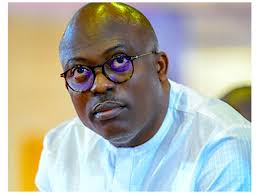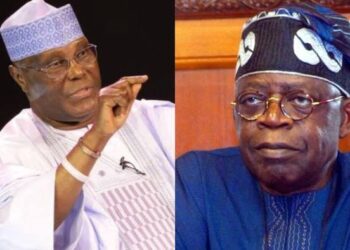 Nigeria’s democracy@15
Nigeria’s democracy@15
Fifteen years ago, democratic ship berthed again on the nation’s political harbour amidst pomp and pageantry. Giving the country’s past experience, not many gave the return of this globally acclaimed system of government any chance of survival in Nigeria, especially when viewed against the backdrop of the previous republics that were ill-fated. Although many will want to explain that at 15, the country’s democracy is still young, it is however a statement of fact that the seamless transition from one administration to the other since 1999 is worthy of some reflection.
This indeed was the scenario during the last Democracy Day marked on a low-key on May 29 across the country, including Abuja, the nation’s capital city. Most importantly, major players on the nation’s political space gave their varied assessment of the nation’s democratic journey. While some are of the view that the country has not done badly, others contend that the journey is far from commencing.
In his own assessment, President Goodluck Jonathan believed that “democratic governance is now entrenched in our nation and institutions. I wholeheartedly believe that our people are the better for it. The scope of fundamental rights and liberties enjoyed by our people over the past 15 years has been expanded beyond measure.”
Our gains
Speaking further on the gains made, Jonathan said: “On my watch, we have witnessed high national economic growth rates, steady improvements and expansion of national infrastructure including airports and roads, the restoration of rail transportation, the efficient implementation of a roadmap for improved power supply, a revolutionary approach to agricultural production, as well as advances in education, sports, youth development, healthcare delivery, housing, water supply and other social services.
“In the oil and gas sector, our promotion of a sustainable local content policy, continues to guarantee equity and better opportunities for Nigerian entrepreneurs and skilled personnel.”
On the economic front, the president announced that “significant increase in mobile telephone and national broadband penetration, making Information and Communications Technology (ICT) one of the fastest growing sectors of the Nigerian economy. We have also developed strong financial markets and regulatory institutions. Our banks now have regional and global footprints.
“Nigeria has also gained recognition as the largest economy in Africa, the most preferred investment destination in the continent and in terms of returns on investment, the fourth in the world. We are pleased that the world has noticed, as global leaders converged in Abuja early this month for the World Economic Forum in Africa.”
Credible elections
Speaking on elections upon which democracy stands, Jonathan prided his administration as making “consistent progress in improving the standard of elections in our country to ensure that they are ever more credible and truly representative of the people’s free choice.
“The National Conference we initiated to deliberate and make recommendations on the best ways of resolving our current political and socio-economic challenges is on-going. It is our expectation that its outcomes will help to further consolidate the gains we have made from democracy in the past 15 years, and place our dear nation even more firmly on the path to greatness.”
Security challenges
The president was however not unmindful of the threat to the nation’s democracy, as exemplified in the current security challenges posed by Boko Haram. He said: “It is a sad fact that as I address you today, all the gains of the past 15 years of democratic governance in our country are threatened by the presence of international terrorism on our shores.
“Our dear country, Nigeria is facing a new challenge. A war has been unleashed on us. Extremist foreign elements, collaborating with some of our misguided citizens, are focused on an attempt to bring down our country and the democracy and freedom we cherish and celebrate today.
“The despicable abduction of school girls from Chibok in Borno State has brought to the awareness of the entire world, the heartless brutality of these terrorists who want to instigate a descent into anarchy and balkanize our nation.”
“Despite the challenges we face, we must commend our security forces. We must not forget their gallantry and successes in liberating nations and in peacekeeping, from Liberia to Sierra Leone, Congo, Sudan, Mali, Guinea-Bissau and many places in Africa and beyond. Our forces have paid the supreme price in several places at several times.
Today, they face a different challenge, an unconventional war by terrorists. They are adjusting and are being equipped to tackle the new menace of terrorism. We must show confidence in their ability. I have no doubt that, with the support of Nigerians, our neighbours and the international community, we will reinforce our defence, free our girls and rid Nigeria of terrorists,” the president added.
Yero, Tukur support
The president’s position gained support from Kaduna state governor, Mukhtar Ramalan Yero and former national chairman of the Peoples Democratic Party(PDP), Bamanga Tukur. According to Yero, the 15 years of the nation’s stable democracy is “a testimony that our great country is on the march to entrenching enduring democratic culture as the only means of exercising power by popularly elected representatives of the people.
“We have never had such a long period of uninterrupted democratic governance in our history as a nation and these calls for celebrations while we continue to trudge on in facing our current challenges. We must not despair as a people because better days are certainly ahead of us.”
In a similar commendation, Tukur, the immediate past national chairman of PDP, believed that democracy has brought value to Nigeria as well as a measure of acceptability and respect in the international community.
He said: “It is a thing of joy that we all have joined hands to sustain our democratic experience for these 15 years. I am happy that democratic republicanism has come to stay in Nigeria.
“I am proud, as an elder statesman to have played a major role for the enthronement of our present democratic structure by struggling alongside other patriotic Nigerians to ease the Military out of Governance even at the risk of our dear lives.”
Divergent views
But some other Nigerians and organisations felt otherwise, believing the country had no basis to celebrate 15 years of uninterrupted democracy amidst varying challenges.
CLO, APC others disagree
In the view of the Civil Liberties Organisation (CLO) for instance, the brand of democracy being practised in Nigerian today was not the type the Nigerians hoped and fought for.
The group which spoke through its liaison officer in Abuja, Comrade Chidi Ekpewerechi stated that CLO is “embarrassed that from May 29th,1999, when the Nigerian people forced the discredited Nigerian military out of active politics till date, nothing has changed.”
The statement noted that “issues of good governance, deepening democracy, access to justice, fighting corruption, security of life and properties of citizens, poverty amongst others have remained static since the advent of the present dispensation.
“Those who occupy positions of authority in Nigeria have failed woefully to give honest and transparent leadership, having subsumed accountability at the altar of corruption. Looting of public treasury has become the order of the day, as the practical burden of poverty and economic hardship has continued to deal with our people.”
While commending the House of Representatives for initiating various probes towards making public office holders accountable, it called on the federal government to release all probe panel reports, mostly those that bordered on corruption, looting and mismanagement of public funds.
The pro-democracy group also called on government to do everything within the law to protect the lives and properties of people living in Nigeria, even as it urged Nigerians to be very vigilant on governance and issues that could deepen democracy.
Their position was corroborated by the Benue state chapter of the All Progressives Congress (APC), which said after fifteen years of uninterrupted democracy, a good government would have used the period to make the country great.
The state secretary of the party, Onov Tyuulugh who made the position known in a stamen in Makurdi, declared: “Nigerians have no reason to celebrate democracy in the face of the ineptitude and almost complete absence of governance by President Jonathan as demonstrated in his inability to rescue the Chibok school girls and his incapacity to contain the slaughter of Nigerians by the devilish Boko Haram.”
Also speaking along same line, a retired Commissioner of Police, Abubakar Tsav said the occasion ought to be used to mourn the failure of a nation.
He said: “I don’t think we have anything to celebrate on the so-called Democracy day, especially considering the general insecurity in the country.
“Worse still, the ravaging incidents of corruption, waste of resources in the land and the entrenchment of a culture of impunity has turned Nigeria to a lawless society under Goodluck Jonathan.”
Atiku cautions
And from former Vice President Atiku Abubakar came a plea to Nigerians jealously guard the country’s democracy which was attained after years of struggle to end military rule in Nigeria.
He called on Nigerians to emulate statesmen and women like late MKO Abiola, Bola Ige, Kudirat Abiola and Gani Fawehinmi, whose lives were fully committed to democracy in Nigeria.
The former VP said: “The responsibility for our country’s democracy lies with each and every one of us. We must participate actively in the process of governance, and ensure that the constitution and the rule of law are upheld at all times.”
He described as pitiful, a situation where the government and the armed forces debate critical issues bordering on national security in public, saying “relations between civil-military authorities should be managed with care and maturity to safeguard our democracy. Some of the issues being discussed in public are not matters for the market square.”
Without doubt, Nigeria’s journey into democracy in 15 years has been tortuous as well as gratifying. While one cannot wish away certain noticeable gains under this period, it is almost important to add that democracy as observed by some analysts, doesn’t thrive on corruption, ignominy and impunity. Further ton this, there should utmost respect among all arms of government to allow the democracy a root. The challenge of making this democracy work, as rightly observed by former Vice President Abubakar is everybody’s responsibility.



